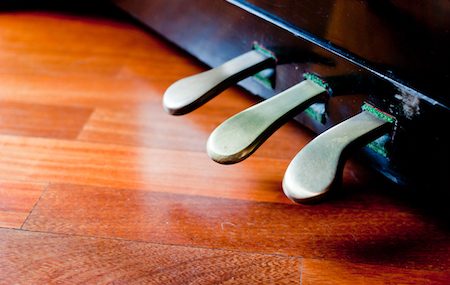When you’re just getting started with playing the piano, it’s only natural to look for shortcuts to buying equipment and learning to play.
The piano can be an intimidating instrument when you first look at it. Eighty-eight keys stretched across the keyboard with white and black keys – how will you ever be able to coordinate your hands together to create music?
And when you look down at the pedals – is it possible to coordinate everything together?
It’s easy to tell yourself you only want to start simply. Do you really need pedals? And what about all of those keys? Won’t a simple keyboard do?
What pedals do
As you’re first starting to play the piano, you won’t use the pedals. Most teachers pay more attention to hand placement, and coordinating the hands together to play music. Pedals come later as you start to get more comfortable making music.
Yet it’s still a good idea to have them in place and learn what they do.
Most pedal setups come with three pedals.
You’ll find the damper pedal on the right. It’s the most common pedal, and is often referred to as the sustain pedal. When you press it down, it lifts the damper from the strings and lets the notes ring out for longer. It creates a longer, more resonant tone.
The middle pedal is the Sostenuto pedal. It holds the notes pressed as you press down on this pedal. Any notes you play after won’t carry past the initial play.
The left pedal is the Una Corda pedal, also known as the soft pedal. When you press a key, it triggers a hammer hitting three strings. If you press a key using the Una Corda pedal, it only hits one, softening the sound.
Do you need pedals?
Pedals may not be a priority for beginners, but they are a part of the learning process. If you keep playing and want to improve your musicality, pedals will eventually be a part of the process.
Most pianists start with the sustain pedal. For many musicians, it’s the only pedal they will ever use.
Pedals are often part of classical music. If you hope to dive deep and wide in discovering music to play, you’ll find yourself experimenting with each of the pedals over time.
Many pop musicians don’t rely on the pedals at all. They create tonal quality in other ways.
Are pedals important for learning to play the piano? Only you can decide.
But for a richer, more well-rounded playing experience, pedals may be just what you need to create music.


